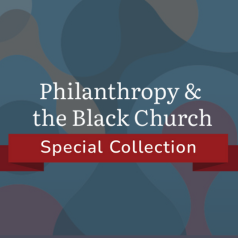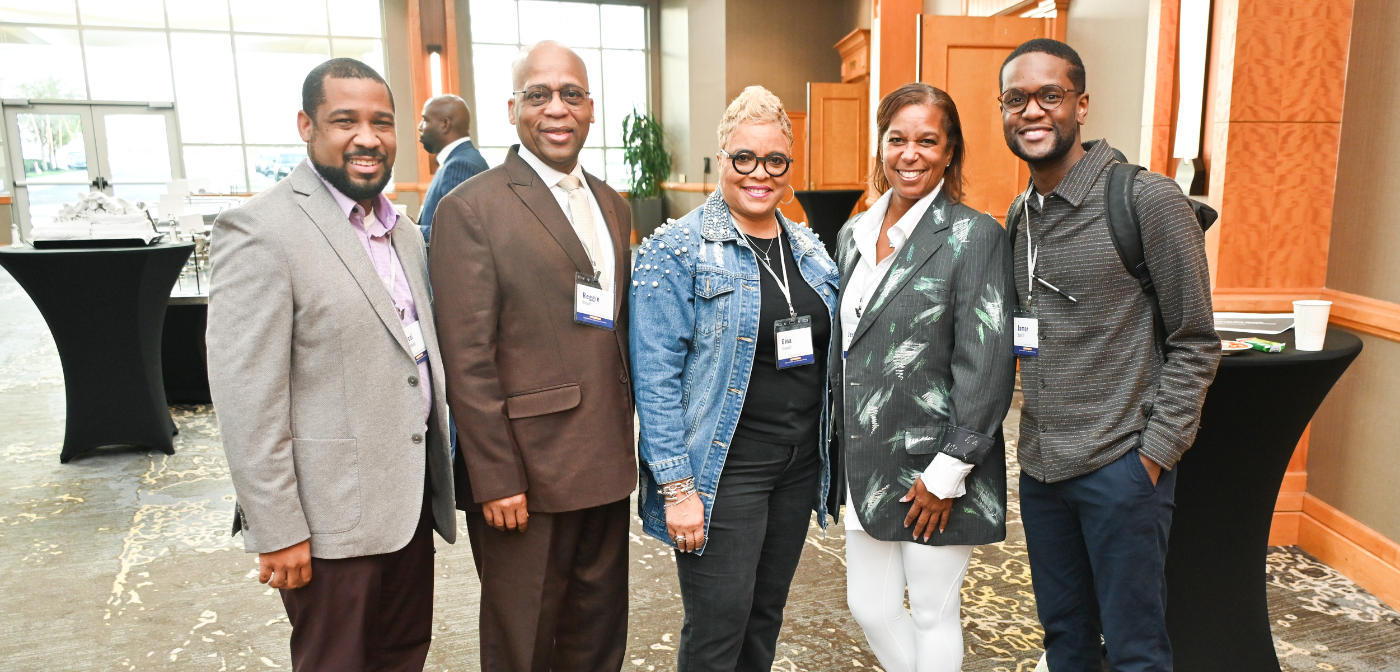‘More than an Event’: Reflections on the 2025 Symposium on Philanthropy and the Black Church
‘More than an Event’: Reflections on the 2025 Symposium on Philanthropy and the Black Church
By Reggie Blount, Tasha Gibson, and Carlos Perkins
The Symposium on Philanthropy and the Black Church is more than an event; it’s a homecoming for the heart, mind, and spirit…To sit among those who understand—truly understand—the weight and the wonder of this work forges a unique kind of connection. Whether it’s an affirming nod that requires no words, a lecture that doubles as a soul-stirring sermon, or the presentation of cutting-edge data to help further inform our work, this gathering is fuel for both our collective and personal missions. – Kia Williams; Founder, Relevant Solutions Group
This past month, in Indianapolis, the Center for the Church and the Black Experience at Garrett-Evangelical Theological Seminary and Lake Institute on Faith & Giving co-hosted the 2025 Symposium on Philanthropy and the Black Church, focused on faith communities in the Black church tradition and philanthropic groups as fellow incubators of leadership and collaboration.
Over two days, eighty leaders from faith, philanthropy, health care, finance, and higher education came together to explore their shared commitment to social impact and to imagine the potential for strategic partnerships between philanthropic actors and Black churches as anchor institutions in communities.
Attendees heard from preservationists and grant makers, from nonprofits that work as intermediaries between congregations and philanthropic institutions, from leaders in healthcare systems, from members of a local Black congregation with a rich history in Indy. Breakout sessions focused on the work of minority depository institutions, the rise of new coalitions for social impact, the spectrum of philanthropic action available, the power of stewardship planning that engages with preservation tools, and more. On Friday, April 11th, the symposium culminated in the 2025 Lake Lecture with Dr. Willie Jennings, who spoke to packed pews at Witherspoon Presbyterian Church on the topic of “Remaking the Commons: Forming a Moral Imagination for Possession and Philanthropy in Place.”
And yet this overview of the symposium as an event does not quite describe the experience. It was, in the words of Kia Williams, “more than an event … a homecoming for the heart, mind and spirit.”
As the Symposium leadership team works together to plan next steps on this project, we want to offer a few very thoughtful reflections from participants, reflections that help us understand the deeper themes and values of the convening.
An Anchor and a Beacon
One participant, Sylvester Jones of Fetzer Institute, reflected in particular on the role of the Black Church, past and future, in inspiring creativity and leading for change.
I am convinced that the Black Church is the original ‘social justice’ institution in the Black Community; therefore, if philanthropy is serious about improving the wellbeing for residents of the Black Community, the Black Church should be considered a critical institution to partner with. In addition to being an anchor institution, the Black Church serves as a beacon of hope, pride, and inspiration. Resourcing and strengthening the Black Church can result in measurable and sustainable change for the Black Community.
As Jones notes, the Black Church is not only a spiritual center—it is the original and enduring social justice institution in the Black community. Long before the rise of nonprofit networks and formalized philanthropy, the Black Church stood at the forefront of civil rights, education, mutual aid, and economic empowerment. It has historically provided sanctuary, advocacy, and structure in the face of systemic inequity, while cultivating a theology rooted in liberation and collective uplift. The Black Church’s reach extends beyond Sunday morning; it builds resilient communities, mentors young leaders, and preserves cultural identity in ways that are spiritually grounded and socially transformative.
If philanthropy is earnest in its commitment to racial equity and improving the well-being of Black communities, it must move beyond transactional engagements and embrace the Black Church as a foundational anchor institution. This requires more than token partnerships or episodic grants—it calls for long-term, trust-based investments that honor the church’s history, capacity, and prophetic voice. Organized philanthropy has a historic opportunity to realign its strategies by resourcing and strengthening Black churches as credible, capable, and catalytic partners in community transformation. To ignore this opportunity is to miss the chance to effect measurable and sustainable change where it is most deeply needed and where hope has long been nurtured: in the sanctuary, in the streets, and in the soul of the Black Church.
The Trust Factor
Another participant, Dr. Jennifer Leath, pastor of Tanner-Price AME Church and associate professor at Queen’s University, names trust as one of the key factors in building those partnerships between philanthropy and Black churches:
The 2025 Symposium on Philanthropy and the Black Church was a reminder:
- For philanthropists to give with comfort and in peace, they must trust the motivation, intent, capacity, and viability of the people and projects in which they invest.
- For Black churches to offer the fruits of their survivalist creativity in exchange for amplifying philanthropic resources with comfort and in peace, they (and their ideal representatives) must trust that they are not unwittingly receiving thirty pieces of silver to bury their prophets, they will not be treated like charity cases, they will not be disproportionately surveilled, and that funders are discerning (and genuinely interested in working with) honest actors whose loyalty is calibrated to optimize transformative service to the most vulnerable (within the parameters of the agreed upon uses of gifts given).
Such trust on the part of philanthropists and Black churches must be cultivated; at best, this cultivation begins with honesty about the haunting anxieties. These anxieties necessitate critical, deliberate, ongoing, and constructive conversations and relationship-building between philanthropists and Black churches. Most valuably, the Symposium carefully held space for these anxieties. Insofar as the Symposium convened Black church and philanthropic intermediaries, facilitating new connections, open communication, and constructive dialogue, the Symposium tilled the soil for a new harvest rooted in truer trust.
Dr. Leath’s insights on trust resonate deeply with the core philosophy that united us in 2023, when we first revitalized this conversation. The question raised by 2023 presenter Devin Murphy—”Who are our Black church leaders looking to from a place of trust to help them?”—remains central. Trust cannot be manufactured or imposed; it must be cultivated through intentional relationship-building that acknowledges historical wounds while creating new possibilities. When philanthropic institutions and Black churches engage in dialogue with genuine openness and respect for each other’s wisdom, we begin the delicate work of reimagining power relationships that have too often been characterized by asymmetry and suspicion.
This trust-building process requires us to move beyond traditional funder-recipient dynamics to create what Ambassador James A. Joseph envisioned decades ago, when he started the Philanthropy and Black Church project at the Council on Foundations: true collaborative partnerships anchored in mutual respect and shared purpose. The Black church brings centuries of resilience, deep community knowledge, and moral authority earned through standing with the marginalized. Philanthropy provides crucial resources, networks, and systems-level perspectives. However, neither can fulfill their highest purpose in isolation. As we witnessed throughout the symposium, the most transformative work occurs when these strengths align in relationships where power is shared rather than wielded, where accountability flows in both directions, and where success is measured not merely in outputs but in the strengthening of community bonds and the flourishing of human dignity.
More
The symposium was more than an event. It was a homecoming. (Thank you, Kia Williams!)
The Black Church is more than a spiritual center. It is a foundational anchor institution. (Thank you, Sylvester Jones!)
And when philanthropy and the Black church partner in trust, the possibilities for transformative work are more than what they could be if either partner acted by themselves. A new harvest rooted in truer trust can abound. (Thank you, Janet Leath!)
Surely, there is also more to do, now, informed by deep listening, and responsive not only to those who have gathered around this work but to those who could benefit from it. If you’d like to learn more about the Philanthropy and the Black Church project, please continue to follow us (Dr. Reggie Blount who leads the Center for the Church and the Black Experience, and Tasha Gibson and Carlos Perkins of Lake Institute on Faith & Giving). And check out a short video of more reflections from participants below.
Explore the Philanthropy & the Black Church Special Collection
 The Philanthropy and the Black Church Special Collection is built on decades of research, insights, and meaningful historical context, providing research, case studies, and resources for Black religious organizations and philanthropic institutions to work together effectively.
The Philanthropy and the Black Church Special Collection is built on decades of research, insights, and meaningful historical context, providing research, case studies, and resources for Black religious organizations and philanthropic institutions to work together effectively.
Philanthropic leaders and Black Church leaders alike are invited to explore this resource library and use the materials to build deeper, trust-based partnerships that will transform communities for generations to come.
Subscribe
Insights is a bi-weekly e-newsletter for the religious community and fundraisers of faith-based organizations that provides:
- Reflections on important developments in the field of faith and giving
- Recommended books, studies and articles
- Upcoming Lake Institute events


